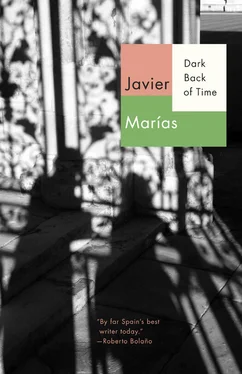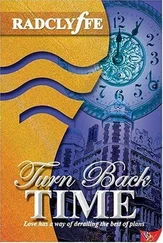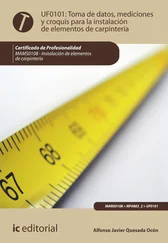
I see them sometimes from my house, the streetlamps that hang from the noble building across the way, with its slate roof which this winter’s snow slipped off even while it began to build up on the neighboring tiles; the slate forced it to keep trying and make an effort and the snow — which is whiter than skin — kept slipping off and melting onto the plaza until finally it stayed. I see the streetlamps, and other things, too, from my balcony on insomniac mornings or when I’ve been treacherously awakened or in the aftermath of reckless revelries, nineteenth-century streetlamps hanging from the wall, their bulbs useless now, and the men and women who walk past them on hurried feet left their beds a while ago and may have travelled in trains from the city’s outskirts to its center, and in those glowing lamps they can see a reminder of the sheets or perhaps the body they left without wanting to, a reminder that for many other people the night still goes on, though dawn has already broken and the light is expanding around them as they walk or wait for a bus, lifting one foot and then the other in place, like tired wading birds — dark night still painted in their eyes — thinking dimly about what they left behind at home and what awaits them over the course of the unending workday, and by the the time the workday ends and they go back, their home will no longer be the same, and perhaps the beloved body from which they parted will have betrayed them. The woman looks at the streetlamps and remembers the man whose scent she still carries on her, who stayed behind in her bed, egotistically asleep. She’s an elegant woman who is almost no longer young, though she still is with a little effort and care on special occasions, she certainly was last night, her low neckline held deep shadows, that dress was bunched up and tossed over a chair, already forgotten this morning, a ghost, she’s dressed soberly now and warmly, she won’t see the young man again, the man who madly ripped that dress off her, more because he was young than from the desire to take it off, he’ll go when he wakes up, without leaving a note, he may even steal something, she’s quite certain he will, it doesn’t matter, the sharp smell of him will be left between the sheets, and the bus doesn’t come. The man looks at the streetlamps and thinks of the woman who gets up later than he does, she goes on sleeping or impatiently pretending to sleep as he prepares to go out into the world, making coffee in the weak light of dawn, she’s not thinking about him right now. He’s a middle-aged man, well-groomed, his hairline receding, it is not within his power to keep her, or only through economics, through his liberal hand, and money is transmutable, substitutable, many people have it, he’s not the only one, and it’s hard to earn, lugging his briefcase around early and late, he’s got nothing that anyone else doesn’t have, and she could find another, future means of support during the day, the days, too many days in which to go knocking, under some pretext, at other doors, and the mystery of this today, her today, which hasn’t yet begun, will await him at his return, added and alien to the sum of too many unknown yesterdays and no tomorrow, the bus isn’t coming and both of them, woman and man, who don’t see or know each other, look at the incongruous lights still lit beneath the sun that advances and makes them pathetic and insignificant, though they are the respectful and benign testament to what has already ceased but once existed: until the sleepy hand of some civil servant takes note of the waste and puts out the light, and then puts it out.
Not everyone or everything that comes to an end receives this testament, though most do, in fact there are only a very few who receive no warning and don’t have the slightest chance to think about or foresee their end: people who ride in cars or boats or airplanes are not among them because even if they don’t dwell on it they know they are at risk, and neither are soldiers or doctors or bricklayers or politicians or those who live alone, almost all of us more or less expect our possible ending when it is about to occur, rare are the cases in which time does not conduct itself in civilized fashion but slices down cleanly with no splinters or forewarning. But they do exist, and I enumerated a few of them in speaking of ridiculous deaths at the beginning of another novel, Tomorrow in the Battle Think On Me . In one case I mentioned, I was thinking of a real person who existed; I refrained from mentioning another one I learned of through All Souls and John Gawsworth, because in a fictional novel it would have seemed too improbable and recherché, even as an example, more so even than the death of the Austrian writer of Hungarian origin, Ödön van Horváth, to which I did allude (“a bolt of lightning that splits apart a tree on a wide avenue, and the tree, in falling, crushes or severs the head of a passer-by, perhaps a foreigner”): he was killed by a tree blown down by a storm on the Champs Elysées in Paris in front of the Theatre Marigny, where he was waiting for a friend, the German filmmaker Robert Siodmak, with whom he was planning to escape to the United States, both of them having fled from Nazi Germany. His light was put out suddenly, in the most unexpected place — without an afterward, without testament — on January 1, 1938, when he was only thirty-six years old; Horvath was a foreigner, not in his own country, he had no warning, and he must have been doubly and superstitiously wept over by his girlfriend, a German actress whose father had died under the same exceptional circumstances — struck down by another tree that was singled out by another bolt of lightning — and who belonged to the family of Mercedes López-Ballesteros, not for nothing is she herself “Freud’s granddaughter.” Even so, it wasn’t my pinchaúvas friend who first told me about the circumstances of Horváth’s death, which I learned of a very long time before meeting her, though she did tell me about the unfortunate girlfriend, who saw this improbable story repeated twice within a single lifetime, her lifetime. I have only one book by Horváth, a play titled Don Juan Comes Back from the War . Robert Siodmak, on whom the tree might have fallen as well if he had arrived on time (or maybe they would both have been comfortably in their seats and it wouldn’t have fallen on Horváth either), did go back to America, which he had left after the crash of $29, and directed a number of films there until he had to leave again during the 1950s, harassed by the anti-artistic Senator Joseph McCarthy’s House Un-American Activities Committee. Among those films is one entitled The Killers (in Spain, Forajidos ), inspired by the famous Hemingway story on which films by Siegel and Tarantino were also later based, which specifically depicts the opposite case, the case of a man who is not only warned of his imminent murder or only possible future, but who waits for the moment to come, reminiscing on a motel cot, without wanting to flee any longer or look for a way out. I’m especially grateful to Siodmak for El temible burlón or The Crimson Pirate , which had nothing at all to do with Defoe’s General History of the Pyrates and which I watched countless times with great enjoyment during my childhood, so that out of retrospective self-interest I’m glad his was not the head severed by the Parisian tree that was singled out by the storm of New Year’s Day 1938.
More mysterious and with even less testament or warning was the death of the English writer Wilfrid Ewart, fifteen years and one day earlier, on New Year’s Eve 1922, “in the sultry darkness of Mexico City,” when he was only thirty. But before speaking of Ewart it may be wise or useful to speak of the person who led me to him through the aforementioned citation and others, and it’s probably best to reproduce here what I knew about John Gawsworth when I wrote All Souls , even if it is a few pages long. Now that I know so much more and he lives in me to some extent, and his ghost lives in my house, and I know his handwriting or his voice that speaks, I wouldn’t be capable of telling the story in the same way, and the way I told it then is what counted then, and that alone. Those who have already read these pages in that novel can skip them — I believe — without feeling cheated (it’s always a pleasure to skip a few pages and it’s almost never possible), and those who have no prior acquaintance with them can read them now without having to spend a cent more to acquire them, though undoubtedly the reproduction will not be verbatim and may include a few marginal notes or scattered comments, so in the end I don’t know if those who are already happily and frivolously preparing to skip them would be wise to do so. Of course they can also skip all the pages, all these pages, without very serious consequences. The nameless narrator of that novel said:
Читать дальше













